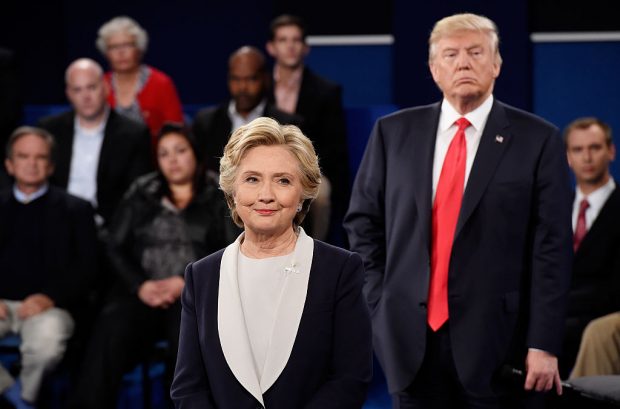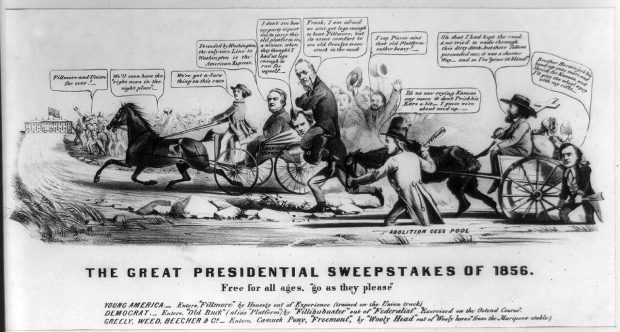 Politics is like baseball. Like Australia’s summer pastime, it’s a numbers game, and there’s an old saying that three economic indicators can predict whether or not the incumbent party in the White House will win or lose the presidential election. Having at least two of three of unemployment, inflation and income growth in the favourable column is predictive of victory. Although workforce participation is down, unemployment is below five per cent, inflation is perversely low and incomes are rising again, i.e. three out of three. But that kind of conventional wisdom — whether it ever held water — isn’t likely to apply in this unconventional election, which appears to be more about everyone having a Bronx cheer about the nation’s ruling class.
Politics is like baseball. Like Australia’s summer pastime, it’s a numbers game, and there’s an old saying that three economic indicators can predict whether or not the incumbent party in the White House will win or lose the presidential election. Having at least two of three of unemployment, inflation and income growth in the favourable column is predictive of victory. Although workforce participation is down, unemployment is below five per cent, inflation is perversely low and incomes are rising again, i.e. three out of three. But that kind of conventional wisdom — whether it ever held water — isn’t likely to apply in this unconventional election, which appears to be more about everyone having a Bronx cheer about the nation’s ruling class.
In two days, the dozen citizens of Dixville Notch, New Hampshire will lead their fellow Americans to the polls to elect their 45th president. Thirty-seven million have cast their ballots already in the many states that permit early voting. The betting markets haven’t moved in the past week though a swing towards Republican Donald Trump is on. Exit polls may tell how much of it is due to FBI Director James ‘Colombo’ Comey’s ‘Just-one-more-thing’-feel letter to Congress over Democratic candidate Hillary Clinton’s e-maelstrom rather than not atypical final-stretch national poll narrowing, “rigged” or otherwise.
Trump is still in the hunt for the 270 Electoral College votes he needs to kibosh Hillary’s coronation. Whether he’ll persuade late-deciders in Florida, which is too tight to call, or across the New England/ Northern Tier in Maine and New Hampshire, which has seen a big red shift this week, or Michigan and Wisconsin or even in perennially tantalising Pennsylvania, which is more competitive, or further west in Colorado and Nevada, where Trump’s made significant gains, it looks to be a long night at Brooklyn Democratic campaign HQ. As long perhaps as when the Dodgers still played at Ebbets Field and the famous 1948 election morning-after first edition Chicago Tribune headline was “Dewey Beats Truman.”
Since the day Trump descended the escalator of his temple to haute gauche to declare a trade war and the need for ‘a truly great leader who wrote (the ghost-written) “The Art of the Deal”’ and I watched his implausible candidacy strike out the GOP’s starting line-up and then be goaded into swinging at every pitch the weakest Democratic presidential nominee since George McGovern (who was nevertheless a thoroughly decent and honourable man), could throw, I’ve not held back in expressing my contempt for the newly minted Republican’s incoherent and intemperate demagoguery. Yet, many Conservatives who are concerned about the creeping regulatory state, which purports to know best about every sphere of our lives, even, increasingly, across freedom’s red line: what we think and say, fiscal incontinence and political constipation, societal polarisation and cultural decay, and the very idea of a Clinton Inc. restoration, but who are appalled by Trump’s ascendancy have nevertheless joined the many millions of Americans cheering Trump on from one non sequitur to the next.
I’m comfortable enough in my own political skin to say, ‘Why, some of my best friends are Trump supporters’ (I can say that about zombie Democrats, too) even if some appear to have had their political souls snatched from their somnolent bodies by Breitbart News publisher and Trump campaign Chairman Steven Bannon in the dead of the night. I get why they’ve made their peace with Trump and sincerely wish them gentle breezes and happy sailing. But not me. Once a Neverer, always a Neverer.
I’ve listened to Trump for decades and long ago considered him unfit for the office of dog catcher, whatever he purports to believe today or his policies, such that they are, might be tomorrow or next week. It’s not just my Burkean and WASPish sentiments that are offended by the idea of electing for president a self-styled “movement” celebrity with a capacious ego only exceeded only by what he doesn’t know about the world around him. We don’t elect policies for president; we elect leaders of government and state. Trump’s recklessness is not the answer to Obama’s fecklessness nor is Trump’s evident ignorance the answer to Clinton’s know-it-all arrogance. But I have, for the same reasons above watched the 2016 presidential election spectacle unfold with a certain morbid curiosity—a bit like watching a train wreck in slow motion or, perhaps more like seeing some deserving schoolyard bully get the snot knocked out of him until he cries uncle. And by bully I don’t mean Trump, though he is one; I mean the whole stale and miasmic political-media-entertainment complex, which deserves to be dragged out to the woodpile more often.
Despite Trump’s temperamental unfitness for the presidency, I’m not a catastrophist. Yes, a bad president can do great damage. But as I like to say, the Federalist Papers make clear that the Founders saw both of these carpetbaggers coming up Broadway when it was still a Wickquasgeck Indian trail. So whatever choice you make for the top of the ticket on Tuesday—or wish for if you’re not in the great American franchise and have a stake more worthy than Vladimir Putin’s—fear not for the Republic or for Liberty. Most voters will be unhappy with the result. But it is, after all, about one branch of one level of government for four years. And if it is Clinton, as I’m tipping, no real mandate and, fingers and toes crossed, a Republican Congress. The mid-terms are just two World Series away, when already we’ll all be talking about who’s on deck for 2020.

Admittedly it’s not an inspiring choice, but we have it better than the voters of 1856, who had to choose between James Buchanan, Millard Fillmore and John Fremont. Historians rate the former two among the worst executives to inhabit the White House. Fremont, an unpredictable adventurist soldier and first candidate of the new Republican party, lost in a three-way split to Democrat Buchannan, after Fillmore’s nativist “Know Nothings” split from the antecedent Whig party. It didn’t end well. But 1856 was also the year The New York Mercury proclaimed baseball the “national pastime.” The Republic righted itself, eventually, and the year the Civil War ended the Dodgers won. This year, despite W.P. Kinsella’s ominously titled 1985 short story “The Last Pennant Before Armageddon,” the Chicago Cubs took the Pennant and Series for the first time since 1908 in a game-seven nail-biter. We’re still here.
Got something to add? Join the discussion and comment below.
Get 10 issues for just $10
Subscribe to The Spectator Australia today for the next 10 magazine issues, plus full online access, for just $10.

























Comments
Don't miss out
Join the conversation with other Spectator Australia readers. Subscribe to leave a comment.
SUBSCRIBEAlready a subscriber? Log in